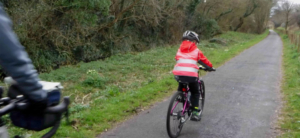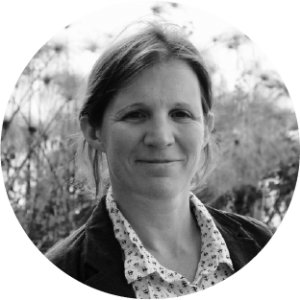Could Girls on Bikes replace GDP?

Latest posts

Could Girls on Bikes replace GDP?

Transforming Youth Employment with Systems Change in Africa

System Change in Action: The Wigan Deal
Share:
The joy of the internet is that amongst all the rubbish and all the scary stuff, there are flashes of brilliance to be found, the sort that makes you see new and joyful possibilities. And the idea of girls riding bikes as an alternative to GDP is one of those flashes.
I tripped over this idea on a wander down the back allies of LinkedIn (generally a rather uncool place of self-promoters) – but here was someone promoting someone else’s idea (always a good sign).
The idea (from economist Katherine Trebeck) goes something like this. If girls ride bikes to school then that means:
- they are going to school
- people (parents) perceive roads as safe enough
- people have enough money to afford bikes
- people don’t have to drive cars just to get their kids to school
- better air quality in cities, and better connectivity in rural areas
- girls feel safe to be out and about on their own
- there is enough gender equity for girls to be riding bikes
- if girls ride bikes, then it also means boys will be riding bikes too
Personally, as a girl who grew up in London and for whom riding bikes to school (and everywhere else) was a pathway to staying safe, to getting out in the world and to expanding my horizons, there is something joyful in this as a measure of a whole economy’s wellbeing.
The idea is, of course, just a glimpse of a much bigger set of ideas around what is an economy for? And how do we know if the economy is getting better or worse? What is an economy that is delivering increasing wellbeing for all?
The point of the girls-on-bike metric is not about the bikes or even just the girls, but about what they indicate.
GDP (Gross Domestic Product) was created as an indicator (not an end in self) – it contained the assumption that if a country had a growing GDP then people would be experiencing an increasing quality of life. And for a time in post-World War 2 Europe, that was largely true. And it remains true for some places.
But as we outstrip the planetary boundaries, as wealth inequality grows and as mental health challenges rise, GDP seems a less and less relevant indicator and a growing GDP may even indicate a decrease in wellbeing.
But it is not enough to know what is wrong with our old ideas we need some new ideas to replace them. We need glimpses of a possible future. And this is where girls-on-bikes comes in.
It’s not a single ‘answer’, no one is suggesting it holds an entire universal economic story in this indicator – but then neither does GDP. What it really offers is a different mental model for even thinking about what a ‘good’ economy looks like.
Part of the power of existing systems is that we absorb them into the mental models that frame how we understand the world around us. The way things can seem so inevitable, so pervasive as simple to be the only way that things could be.
It becomes hard to imagine other ways of seeing and thinking. GDP growth has become such a dominant mental model for what a ‘good’ economy is, that it smothers all other possibilities.
So some of the elegance of the girls-on-bikes metric is not that it is necessarily right, but that it gives us a picture of alternative possibilities. It doesn’t just say what is wrong with GDP (which is a well-rehearsed argument even by some very conventional economists) but it suggests a glimpse of possible future – and that makes all sorts of other things imaginable.
Note
Katherine Trebeck is part of The Wellbeing Economy Alliance, a collective of economists offering new ideas on how we can understand progress and wellbeing and growth. And they have a lot of other ideas to share – check them out, including a great conversation with Katherine herself.
Share:
We are looking for country MLE officers - Kenya and Rwanda
Latest posts

Could Girls on Bikes replace GDP?

Transforming Youth Employment with Systems Change in Africa

System Change in Action: The Wigan Deal
Share:
Join our team!
We are looking for two monitoring, learning, and evaluation (MLE) professionals to provide support to the Kenya and Rwanda country teams at the African Food Fellowship. The MLE Country Officer (MLECO) will also support the team to learn from the information generated and from the events organised.
How to apply
- Include a CV no longer than 3 pages.
- Include a cover letter that at minimum summarises:
- Professional MLE expertise
- Track record of relevant MLE experience
- Motivation to apply
- Submit the cover letter and CV to [email protected]
- Use the subject heading: Application – AFF MLECO
- Application deadline: 25th August 2023
Share:
We are looking for a Graphic Designer
Latest posts

Could Girls on Bikes replace GDP?

Transforming Youth Employment with Systems Change in Africa

System Change in Action: The Wigan Deal
Share:
Wasafiri is excited to announce an opportunity for a skilled and creative graphic designer to join us. If you have a passion for visual storytelling, an eye for aesthetics, and the ability to bring ideas to life through stunning designs, we want to hear from you.
Don’t miss the chance to showcase your talent and make a meaningful impact.
How to apply
- Please include a CV that is not longer than 3 pages.
- Clearly indicate the role title “Graphic Designer” in the email subject.
- Please include a short cover letter that summarises the following:
- Your motivation for applying to Wasafiri
- Your technical expertise and qualifications
- Samples of your work
- 3 professional references
- Please note:
- We will not accept submissions without a CV and cover letter.
- We will not accept CVs longer than 3 pages.
Application process
- Closing date for applications: 21st May 2023
- Please submit your cover letter and CV to [email protected]
Share:
The cost-of-living crisis: building more collective responses

Latest posts

Could Girls on Bikes replace GDP?

Transforming Youth Employment with Systems Change in Africa

System Change in Action: The Wigan Deal
Share:
The UK cost-of-living crisis is a complex problem.
- It has multiple root causes (inflation, the war in Ukraine, fuel prices, long-term economic trends and more).
- It is dynamic so it is changing and shifting as we work on it.
- No single institution can solve it alone (however powerful well intentioned or well-resourced they are). It is a problem that will only give in to collective action.
- And finally, some of the reasons it is so hard to shift is that there are trade-offs. Putting up wages puts pressure on inflation (and raises costs). Higher taxes have both political and economic implications, likewise with greater subsidies for things like energy costs.
For these reasons, there are no simple answers to the cost-of living crisis; no silver bullet solutions to reach for.
So, what do we do next?
In moments like this, when faced with problems with a high degree of complexity and uncertainty about ‘who should do what’, we need to stop calling for other people to ‘do something’ and start building better collective responses.
Complex problems by their nature need collective actions. We need actions that vary by context – that are adapted for different social groups, regions and the different ways that the cost-of-living crisis is driven and experienced.
Wasafiri has been supporting a range of organisations and clients with their work to build more collective responses to the Cost-of-Living Crisis:
- The Forward Institute has convened leaders from across some of the UK’s leading public, private and not-for-profit organisations. And together they are sharing ideas, collaborating and getting practical with their response.
- Brighton & Hove City Council convened a summit (facilitated by Wasafiri) that brought key partners together to align and coordinate support, share information and identify ideas and actions to strengthen a collective response. The large turnout demonstrated the high levels of motivation to work more collectively across the city.
Across this work we are noticing a few trends:
- The cost-of-living crisis cannot be solved at the individual level – food banks, personal finance advice, low-interest loans for travel passes, and even home insulation are all things that will help people to live in the current context but won’t change the context. They are useful and important, but they are a response to the presenting problem – not an attempt to shift its causes.
- Local collective action – the specific drivers and experiences of the cost-of-living crisis vary by geographic region but also industry, demographics, and a whole host of other variables. Consequently, responses need to be equally varied.
For example, in Cumbria, a rural area in the north of England, there is a lot of available employment but the cost of transport is a significant barrier to people accessing it. The current (government-funded) experiment to cap bus prices at a flat £2 has more than halved the cost of bus transport in the region and opened up employment opportunities.
For an even more innovative (and artistic) attempt to take a collective response check out Power, a project to get a street in London to become its own green power station. The Power project is a recognition that the incentives for individuals to invest in things like solar panels just don’t stack up. On top of this there are significant barriers for individuals including finding suppliers, dealing with planning permissions, having the upfront cash to invest. By taking a collective approach the logistics and the financial incentives are shifted and a sense of belonging and community is created.
Let’s look to the long term
The cost-of-living crisis is a symptom of an underlying system driven (in part) by a dependency on carbon-based energy. We know that we need to change this.
As the cost-of-living crisis stimulates us to change the way we do things – like how we build our homes, use transport, the food we eat, the energy we consume, the products we reuse (or never use) – let’s make these changes not just to get us through this storm but to help us adapt and move towards a more sustainable and even regenerative future.
Join our community of system change leaders.
To learn more about Systemcraft, our approach to complex change, and how to use it in your work – sign up for our online course.
Photo by Sarah Agnew on Unsplash
Share:
Wasafiri’s Systemcraft Institute launches new short course

Latest posts

Could Girls on Bikes replace GDP?

Transforming Youth Employment with Systems Change in Africa

System Change in Action: The Wigan Deal
Share:
LIVE – our new Systemcraft Essentials online course
Systems thinking and complexity seem to be everywhere – but are you left wondering “so what do I actually do next?” If so, then check our new online on-demand Systemcraft Essentials Course.
Systemcraft is a practical framework for creating change in a world that is volatile, uncertain, complex and ambiguous. It has been reverse-engineered from Wasafiri’s experience working on some of the world’s toughest problems. It has been used by leaders in organisations such as the National Health Service, the British Army, Legal & General, FCDO, Mars, Save the Children and many others.
Systemcraft Essentials brings together all the core ideas and key tools that leaders need to start applying Systemcraft to their own context.
Why join now?
- Get 1/3 off course fees with our early bird offer (pay before xmas, take the course any time)
- 4 self-paced modules
- Practical tools
- 5 hours to complete
- A free one-on-one call with a Systemcraft expert
- 1 month’s free access to our online community of practitioners
Sign up now for the course and join our wonderful community of practitioners. (Our early bird offer ends on 25 December!)
Find out more about Systemcraft and the work we do.
"Wasafiri helped us identify new and practical ways we could make progress on some really difficult, longstanding issues. Systemcraft was key in helping us think in new ways about very familiar things."
Stephen Clayman, Commander, Metropolitan Police Service
Photo by Johannes Plenio on Unsplash
Share:
Dying with dignity: time for palliative care for corporations?

Latest posts

Could Girls on Bikes replace GDP?

Transforming Youth Employment with Systems Change in Africa

System Change in Action: The Wigan Deal
Share:
Organisations do die; palliative care could reduce the destructive and increase the creative impact of their passing
I was recently working on a Forward Institute event with the rather brilliant Scott Morrison of The Boom!1 He asked the audience “what are the most heretical questions you could ask about your organisation?, This question has sent me off on all sorts of mental meanders and what-ifs. The latest being: Should our organisations really strive to live forever? Could it be a good thing for organisations to die off at some point?”
Much of management and organisational development is centred on the assumption that longevity is a good thing. That being able to reinvent, restructure and pivot are the practices we need. That endless regeneration and never-ending existence are the ultimate goals. That survival is the ultimate performance measure2. But is it? Everything in nature ages and ultimately dies with new growth flourishing in the space created. In reality, organisations will have their time in the sun and then pass on (with increasingly few passing the 60-year mark) and some suggesting as little as 18 years is a reasonable life expectancy3 yet the myth of immortality is a strong one. A myth that often seems to lead to painful deaths, heralded by increasingly bellicose claims of reinvention, promises of new dawns and possibilities and ending with dramatic and painful collapses.
Others have argued in favour of the value of corporate death. Joseph Schumpter is perhaps the most famous with his idea of ‘creative destruction’ and the argument that large companies are inherently inefficient, and ultimately suffer from ‘entropy’ where they spend more time managing themselves than doing whatever it is they are supposed to do in the world. But there is a long distance between what is good in principle and what is good in practice. Schumpter’s principle of ‘creative destruction’ often in practice means the destruction of people’s lives and livelihoods, and, especially when an organisation has a strong geographical footprint, their communities. But what if responsible leadership included knowing when your organisation’s time was up? What if with good palliative care organisational demise need not be ‘destructive’? Maybe palliative care could create a graceful decline and provide individuals and communities with the opportunity to move on in timely, happy, and healthy ways?
What might organisational palliative care look like?
Step one: Timely diagnosis
By acknowledging that the organisation has reached its twilight years we can all prepare for a transition. Customers have time to find alternative options with less risk of price gouging by unscrupulous competitors. Suppliers have time to diversify and employees can think about what new skills they might need and take the time to find new opportunities. Local markets won’t be flooded with a sudden unemployed workforce all competing with one another.
Step two: Managed decline
Our organisational models are built for growth – we know how to add and do more – but how about doing less? Perhaps staff move from full to part time employment or the entire organisation shifts to a 4-day workweek. There will undoubtably be plenty of puzzles to manage as we simply haven’t built organisations that are alive but slowing down; we will need markets not scared of big players that are doing a good job but reducing rather than expanding their activities. Customers need to value the old-age organisational citizens in their world and not just the young and new. There needs to be confidence in the provision of ongoing support for products whose life cycle may be longer than that of their producer.
Step three: Make good choices about divesting assets
Are there buildings, machines, or existing inventory to be sold off? The current mode of sudden collapse makes these sorts of assets easy prey for post-bankruptcy acquisition often allowing asset stripping by predatory interests. But what if these assets could be moved on with care and consideration – perhaps with the money raised forming an inheritance for the employees or communities that will be affected by their passing?
Step four: Celebrate the passing
I remember the passing of the British high-street staple Woolworths4; a final splutter of press attention and then a quick burn out… and with it a load of pain for the 30,000 people that worked there. I also remember the aftermath; the flurry of joy at shared memories of ‘the Woolworths bargain bin’- a place many of my generation bought their first music albums (Tears for Fears for me). At the time I hadn’t been in a Woolworths store for many years, but its passing brought back a nostalgic memory of happy time and ritual. Maybe palliative care would include a celebration of past success rather than glorifying in the moments of collapse?
The reality is most private sector organisations do, eventually, age and decline. And perhaps this is not such a bad thing. Perhaps we just haven’t yet learned how to responsibly help them age with grace and pass with as little pain as possible for the people that depend on them. All living systems include death as well as birth; as we face the climate crisis and the need to reimagine our economies, our modes of energy production and much else besides perhaps ‘organisational palliative care’ can help us create the new world we need?
Wasafiri currently works with the Forward Institute, a not for profit that works with many of the UK’s leading public, private and charitable organisations to make ‘responsible leadership the only form of leadership’. Through the use of Systemcraft we help leaders tackle the complex problems they and their organisations are wrestling with as they play their part in creating a more sustainable and equitable world.
Written with thanks to Adrian Brown, Executive Director of the Centre for Public Impact for the, as always, help to think about things a little differently.
- https://www.unleashtheboom.com/
- Mckinsey Report 2014 https://www.imd.org/research-knowledge/articles/why-you-will-probably-live-longer-than-most-big-companies/
- https://www.imperial.ac.uk/business-school/blogs/executive-education/why-companies-die/
- Woolworths was a low-cost department store in the UK, not related to the South African brand, that went bankrupt in 2008 https://en.wikipedia.org/wiki/Woolworths_Group_(United_Kingdom)
Share:
Brenda Mareri joins the Wasafiri team!
Latest posts

Could Girls on Bikes replace GDP?

Transforming Youth Employment with Systems Change in Africa

System Change in Action: The Wigan Deal
Share:
 With a wealth of experience in international trade and sustainable development across Africa, Brenda Mareri brings a deep passion for food systems transformation, a rich network, and skills in helping countries build health and nutrition businesses.
With a wealth of experience in international trade and sustainable development across Africa, Brenda Mareri brings a deep passion for food systems transformation, a rich network, and skills in helping countries build health and nutrition businesses.
Communication Manager, Stella Odhiambo, interviews Wasafiri’s new Senior Manager for the Food Systems and Inclusive Growth portfolio.
We are very excited to have you join the team, Brenda. What is your role at Wasafiri?
My new role is Senior Manager within the Food Systems and Inclusive Growth (FSIG) portfolio. This includes taking on the responsibilities of Dean and Kenya Implementation Lead of the African Food Fellowship Leadership Programme, a joint venture by Wasafiri and Wageningen University and Research (WUR) to spark food systems leaders.
As Senior Manager – FSIG, I will identify opportunities to expand the portfolio by supporting new business opportunities in Africa and globally.
As the Kenya Dean and Implementation Lead at the African Food Fellowship, I will lead on recruitment, provide support, coordination, planning and mitigation, and respond to challenges for the smooth function of the cohorts in Kenya. My role is pivotal in supporting the fellows to successfully complete the Food Systems Leadership Programme.
Tell us a bit about what brought you here.
Wasafiri’s work in transforming the agriculture sector from a systemic approach for sustainable growth and change appealed to me. I see Wasafiri as an organization that will provide a strategic platform for me to learn and use my expertise to contribute significantly to transforming food systems in Africa.
I was impressed by the milestones that have been achieved by the African Food Fellowship. The Fellowship resonates with my belief that transforming the agriculture sector is a cause that needs strong leadership in practice, policy, innovation, and implementation.
I was particularly drawn to the Fellowship because it empowers emerging leaders working in food systems with leadership competencies to apply a systems change approach for sustainable change in their sectors. And there is no change without competent leadership.
With vast experience tackling complex systemic problems in food systems within East and Central Africa, what are you most looking forward to now?
Several things! For starters, further investing in the nutrition components that focus on leveraging existing technologies in breeding, digital technology and capacity building.
I also look forward to providing the relevant support needed to advance the food systems initiatives within the African Food Fellowship. This will largely involve:
- Linking fellows to relevant strategic partnerships and opportunities.
- Organizing coaching and mentorship sessions.
- Leveraging my networks within the industry to build relationships with other Food Systems leaders.
- Being a sounding board to reflect on critical food systems issues and facilitate an ecosystem of engagement.
Connect with Brenda
Photo by Markus Spiske on Unsplash
Share:
Alex Rees is Wasafiri’s new Managing Director

Latest posts

Could Girls on Bikes replace GDP?

Transforming Youth Employment with Systems Change in Africa

System Change in Action: The Wigan Deal
Share:
Alex Rees became Wasafiri’s new Managing Director on April 1, 2022. He sat down with Communications Officer Stella Odhiambo to discuss his new role and what he’s most (and least) looking forward to.
In one sentence, what is your one new responsibility as MD that you did not have as Food Systems and Inclusive Growth portfolio lead?
Wow, well I’m very excited to be leading such a wonderful, innovative and values-driven organisation and of course, playing an MD role for the first time!
What’s the most exciting aspect about becoming MD of Wasafiri?
There are many exciting aspects of becoming MD of Wasafiri, and let me share two…
The first is that it allows me to continue to heed my father’s advice from when I was setting out in my career: ‘…seek out the most effective people who are fun to work with – and go work with them’.
Another is that over five years I’ve seen just how amazing Wasafiri is from the inside, not just in the accomplishments it has achieved typically in very complex areas where we work like countering violent extremism on the coast of Kenya and helping food systems evolve through support to small food businesses – but also in how we work in the world. I’m consistently impressed by how Wasafiri manages to punch above its weight – in part because we build relationships for the long term. I intend to continue this trajectory.
What’s most daunting?
Good question, I think the most daunting aspect is filling the shoes of the wonderful Kate Simpson who has done a fantastic job over the past four years in enabling our operating system, culture, systems approach and impact to really take off.
I’m delighted she will be around in the months and years ahead to offer sage advice. She now leads our new Wasafiri Institute as we create new ways to help systems leaders have even more impact with the challenges they are facing. You’ll hear about this in 2022!
What’s your vision for the future of Wasafiri as we launch Wasafiri 3.0?
My vision for Wasafiri is that we accelerate how we support diverse systems leaders to better grapple with some of the world’s toughest problems from local communities to global gatherings in the areas of violent extremism, conflict, climate change, loss of nature, food systems and reducing poverty.
I believe that Wasafiri can play a leading role, both in bringing systems leadership into focus for more people and critically, helping people develop their systems leadership in day-to-day decisions so that it is used to improve lives and the environment.
Anchoring collaborations that empower individuals and groups to make different decisions, particularly if disadvantaged, is what truly inspires me.
I’m very excited about the next year or two with Wasafiri looking to advance three areas:
- Establish our Wasafiri Institute with firm foundations so it can thrive in years to come
- Grow and diversify our work stabilising conflict settings and transforming food systems
- Making a meaningful contribution in tackling climate change and encouraging nature to rebound
Connected to these, I’d say we intend to make strides in innovating at the nexus between conflict, food and climate. These issues typically affect people and our environment together and I’m confident there is more we can do to tackle these issues in a joined-up manner.
What management style or approach do you plan to take as MD?
I see my job in simple terms: empowering people across the business to make good decisions.
Wasafiri has an effective decentralised ‘domain’ model where individuals lead their areas, taking all relevant decisions. We actively avoid decision-making easing its way up towards the MD. And like my predecessor from whom I’ve learned much, I look forward to nurturing this model and supporting the people best equipped to make good decisions.
How is Wasafiri different?
Let me share two important ways among many that I feel Wasafiri is different:
Firstly, we believe we’ve proven the value of a globally significant and practical systems change approach, which we call Systemcraft, in practical settings with diverse leaders at all levels who wish to make better decisions today and tomorrow for the longer term. Clients, consultants and partners are valuing Systemcraft in support of their strategic and day-to-day decisions.
Secondly, we’ve nurtured a lovely and special culture as staff, with our consultants, and with our partners and clients. We call it ‘Wasafiri spirit’. This feels important to us, and I’m keen we continue to shepherd our culture as we grow.
Get to know the MD
What’s his favourite thing to eat and what was his last search on Google? Get to know Alex some more in this fun video.
Photo by Photoholgic on Unsplash
Share:
PHONE
+44 (0)1273 830335
+254 (0)797 519466
+1 828 407 6585




